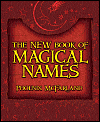
When you can name something, it is said, you can control it. That’s one reason the standard-brand god told Adam (in Genesis 2:19-20) to give names to every living creature. That’s one reason we still have lists of the name of demons, too, even though few people have tried to control demons since the Middle Ages. It has long been the custom in occult and magical societies and among occult and magical folks to use their mundane names in mundane places—on the job, in government documents, etc.—but to select or be given a secret name for magical work. Sometimes this name is known only to one’s peers and is never shared with the outside world, and because it’s considered to be a soul name, it’s the name with the person’s authentic power. Other times, the magical name is a sort of nom de plume assumed by people who may want to open a magical business or write for magazines like this one. The magical name is seen to be … well, more magical, more romantic. More pagan.
Phoenix McFarland has revised and expanded her 1996 Book of Magical Names. She opens with a useful history of naming that focuses on the British Isles. Because of their pagan echoes—the name Alfred, for example, comes from Aelfraed, meaning “elf” and “counsel”—most Old English names didn’t survive past the 13th century. At the beginning of the 14th century, she says, one third of the males in England were named either William or John. To avoid confusion, most guys were given nicknames, often based on physical attributes or their trades, and these nicknames eventually became their surnames. One fascinating list is the Puritan names (1500-1640). These are genuine names and include Abstinence, Do Good, Flea-Fornication, Judas-Not-Iscariot, Onesiphorus (“profit-bearing”), and Tribulation Wholesome.
Anyone who wants to rename her- or himself has grand lists to choose from. Whether you’re renaming yourself, naming your children or the furry folks who live with you, your coven or circle, or even the characters in stories you write, this book is your best resource. There are long chapters with name lists and the definitions of names. Some names come from “inner sanctums”: descriptive and archetypal names like Voyager, Renegade, and Kindness. From “out of the blue”: bird and cloud names. From the space/time continuum: time names like Nightfall, space names like Arcturus, spacecraft names like Quantum. From light, dark, and in-between, including colors. From the silver screen: the names celebrities have given their children (we all know the Phoenix family: Rainbow, Leaf, River, Liberty, and Summer Joy) and names of the celebrities themselves: Colm, Dixie, Fabian, and Swoozie, among others. From the kitchen: food and spice names. Last names as first names: Baxter, Llewellyn, Windsor.
Names of magical people. This chapter is enormous fun and includes McFarland’s own list of names she’s worn, from Laurel Jean (what her mother calls her) to Fusses with Blueprints (her husband’s name for her “renovation persona”). Here we also find names like Dendera Wisepsychic, Lord Silver Shadow Knight, and Rainbow Zend, plus a list of nifty coven names, from 13th House Mystery School to Thorn & Oak. (Some of these, she says, are names really used.) Names from Mother Earth include all four elements, plus gems and crystals. Names from exotic locations reach from Africa to Biloxi to Kodiak to Wessex, and cover most of the geography in between. From the Green Man’s Garden: flower, tree, and plant names. From world mythology and from ethic and cultural groups around the world (African to Teutonic). And from literature. You can choose from King Arthur’s court and Beowulf, from the Darkover and Discworld novels, from the Aeneid, the Nibelungenlied and the Song of Hiawatha, and from Shakespeare and Harry Potter and a dozen other literary sources. If you don’t find your best new magical name in this book, it’s not likely you’ll find it anywhere else.
~review by Barbara Ardinger, Ph.D.
Author: Phoenix McFarland
Llewellyn, 2003
